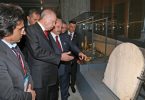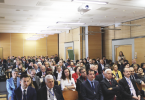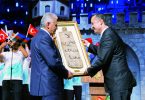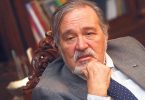The 19th century was a period of change for both East and the West, especially with regard to intellectual culture. Rapid developments have emerged in science and its area of application, technology, and the society also went through radical changes naturally as a consequence. To produce “knowledge” and “more knowledge” was the dominant factor in the intellectual understanding of this period. In the West, the foundations of these changes date back to the 17th century. However, the implications of the scientific transformation in the West can be observed in the Ottoman Turks after the 18th century.
INNOVATION MOVEMENTS IN OTTOMAN
Ottoman innovation movements began with the establishment of military academies, and this also influenced the development of Ottoman science and the transfer of Western science. The establishment of Mühendishâne-i Bahri-i Hümâyûn (Imperial School of Naval Engineering) in 1773, and Mühendishâne-i Berrî-i Hümâyûn (Imperial School of Military Engineering) in 1795 and foundation of Military School of Medicine, Darülfünun (Ottoman University), Mine School and the Civil Medical School in the 19th century, are proofs of this. The establishment of these schools laid the foundations and important scientists as Hodja Ishak Efendi, Hüseyin Rıfkı Tamani, Fatin Gökmen and Salih Zeki were raised. Tanzimat (Reform Era) was declared in the Ottoman Empire in 1839, the First Constitutional Period in 1876 and the Second Constitutional Period in 1908, and social and political reforms were introduced which deeply influenced scientific activity.
Founder of the Republic Mustafa Kemal Atatürk, born and raised in an environment of political and intellectual change and formation, believed that the victories of a country in battlefields should also be continued in the fields of science and culture, and while forming a new political structure, he did not neglect to work on what the foundations in the fields of science and culture should be.
Atatürk, who was aware that scientific and science-based activities were the motivation underlying the development of the West, felt the need to say the famous quote “Our true mentor in life is science,” to get this reality across to people. This quote is in fact a definition that also summarizes the principles on which the Republic would be based on.
After the proclamation of the Republic, Atatürk laid emphasis on rapid establishment of institutions and organizations which would put these thoughts into practice. The first of these institutions was Istanbul University. With Atatürk’s efforts, Darülfünun reopened as Istanbul University in 1933 with the University Reform and attained a well-deserved position at an international level. This way, the scientific developments revived in the late period of Ottoman Turkey, reached to an even higher level with the proclamation of the Republic. As a result of this positive climate, numerous top-calibre Turkish scientists have been raised who have contributed to many science disciplines and have been deemed worthy of international science awards for their contributions.
FIRST RESEARCH IN MATHEMATICS
The first research in mathematics in the Republic period was conducted in 1928, with the articles published by Kerim Erim and Hüsnü Hamid in Italy. These were followed by the studies of Ratip Berker. In this period, subjects such as fluid mechanics, and elasticity came to the fore. Later; Cahit Arf, Hülya Şenkon, Orhan Alisbah and Nazım Terzioğlu conducted studies on analysis and algebra, Kerim Erim, Lütfi Biran, Ferruh Şemin and Feyyaz Gürsan on differential equations, and Cengiz Uluçay on theory of functions and foundations of mathematics, which gained weight.
ASTRONOMY, PHYSICS AND CHEMISTRY
Astronomy studies are currently conducted at several universities and observatories affiliated to these universities. After Kandilli Observatory, a small observatory was established in the garden of Istanbul University in 1933. This observatory was followed by observatories established in other universities. A radio telescope activity was launched under the Department of Astronomy, founded in 1999 in Kayseri Erciyes University, and this was a pioneering study in this field in Turkey. The idea of establishing a national observatory emerged in the 1960s. After TUBITAK and DPT collaborated in 1992, observation activities were launched in 1997 in Antalya with the name TÜBİTAK National Observatory (TUG). Among astronomers who contributed to astronomy, are Turkish scientists Nüzhet Gökdoğan, Fatin Gökmen, and Abdullah Kızılırmak.
Theoretical physics and atom physics are among primary disciplines of science, and Turkish physicists have achieved a significant place in world physics. Feza Gürsey, Asım Orhan Barut, Cavid Erginsoy, Oktay Sinanoğlu and Erdal İnönü are among prominent scientists in physics and have made their marks in the world of science with their theoretical studies.
The Republic era was also a period of breakthrough in terms of chemistry. Chemistry studies began with the establishment of the Chemistry Institute under the roof of Istanbul University in 1918 for the first time in Turkey, and became widespread in other universities shortly after. Today, Turkey has an important position in the world in the field of chemistry. Aziz Sancar received the Nobel Prize for Chemistry in 2015 which is an important indicator of Turkey’s success.
The first works on Geology were written in the 19th century, and the Mineral Research and Exploration Institute has carried out major studies in the subject in Turkey throughout the Republic period. Today, there are many scientists who work in this field. Among these figures are Şevket Ahmed Birand, Ahmed Canokay, Bedri Güneri, Fahriye Atıf, Hamid Nafiz Pamir and Celal Şengör.
In the field of biology and medicine, important steps were taken with the Republic. Biology was included in the medical education curricula in the second half of the 19th century and was discussed again with the Republic. Some scientists who worked in the field are Hikmet Birand, Suavi Yalvaç and Yusuf Vardar. In later years, mainly research studies were conducted, and important studies have been carried out on the fauna and flora of Turkey in botany, and on bald ibis and sea turtles in zoology.
The first serious attempts in veterinary medicine, another field where significant progress took place during the Republican Period, were made during the Ottoman period. The first scientific veterinary education began in 1842 with the establishment of the Military Veterinary School. It is possible to say that with the Higher Agriculture School established in the Republic period, a systematic education and training began in this field.
MEDICINE AND PHARMACY
Another area where significant developments took place with the Republic, is medicine. Medicine is generally a discipline that develops earlier compared to other disciplines and has a larger body of researchers than other disciplines. As seen in other disciplines of science in the Republic era, right after the proclamation of the Republic, there were many physicians born in the Ottoman period and started to serve in Atatürk period. Among these physicians who served in the early years of the Republic are Besim Ömer, Mashar Osman, Akil Muhtar, Saim Dilemre, Haydar Ismail Gaspıralı, Fahreddin Kerim Gökay, Muzaffer Dilemre, Reşit Galip, Kemal Akay and Süreyya Tahsin Atademir. In the following years of the Republic, the number of physicians increased and some of these physicians were Hulusi Behçet, Tevfik Sağlam, Nurettin Berkol, Muhiddin Dilemre, Kemal Cenap Berksoy, Melahat Terzioğlu, Sadi Irmak and Saip Ragıp Atademir. In addition to these names, the doctors who continue to serve today are Kemal Beyazıd who performed the first heart surgery in Turkey, Aykut Kazancigil, Ekrem Kadri Unat, Hatemi Hüsrev, Besim Türkan, İhsan Günalp, Ali Rıza Akısan, Kazım Arısan, Muammar Bilge and Orhan Andan.
The field of pharmacy, closely related to medicine and health, has taken its current form with the Republic in the real sense. With the rules adopted in 1928 with the Republic, the pharmacies then managed by minorities, gradually passed into the hands of Turks. During this period, Turkish Pharmacists laid the foundations of modern pharmacy in Turkey with ardour and enthusiasm. Among them, Hüseyin Hüsnü Arsan, Kemal Atabay, Hasan Derman, Ferit Eczacıbaşı, Nevzat Pisak, Ethem Ulagay and İsmail Yeşilyurt were the pioneers.
As is seen, thanks to the positive terms circumstances created in the last period of the Ottoman and Republic period, many top-calibre Turkish scientists have been raised who have contributed to various science disciplines and have been deemed worthy of international science awards for their contributions.









Leave a Comment